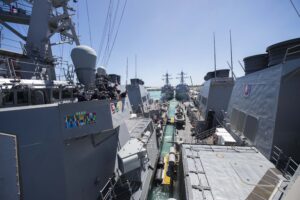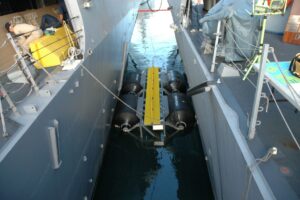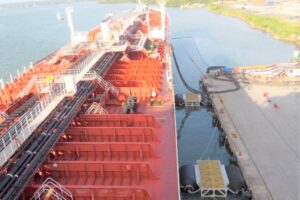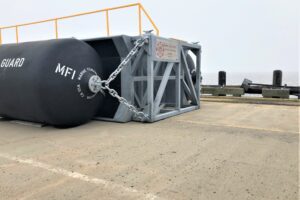What are Ship Separators? How do Ship Separators Work?
Ship separators are floating devices typically designed either with Ocean Guard netless foam-filled fenders. Ship Separators are typically designed to provide a certain minimum required standoff between a ship and ship or ship and a dock. Ship Separators will be used for the alongside mooring of ships for the protection from ship-to-ship damage due to vessel maneuvers where vessel-to-vessel or vessel-to-pier contact may occur. It protects ship hulls and absorbs environmental and berthing loads during mooring. These portable structures operate with either a buoyancy chamber or an associated floating device, typically the Ocean Guard netless foam-filled fenders. Designed to be corrosion-resistant and flexible, composite ship separators can be used in different mooring conditions to prevent damage to ships by other vessels, docks, or wharves.
Ship Separator Applications
Mooring a vessel involves attaching a ship or vessel to a dock, mooring buoy, berth, floating platform, or another ship. To achieve this, a vessel must be positioned alongside the mooring location and then secured using anchors, ropes, or wires.
As your ship aligns with the mooring, protection is necessary to avoid damage to the ship hull and offer safe navigation for personnel between the ship and mooring. Ship separators provide this type of protection for various mooring applications, including:
- Ship-to-Ship Mooring. This type of mooring is often used for breasting of ships, such as Naval ships or to transfer cargo from one ship to another. Ship separators can be designed to provide additional standoff between the vessels. They are commonly used with the Arleigh Burke class of guided missile destroyers (DDGs) which have very wide bow sections. During ship-to-ship mooring or breasting operations they prevent damage to both ships.
- Ship-to-Wharf Mooring. A wharf is a structure on a sea or river that provides a safe location for ships to dock. In these applications, ship separators are typically designed to provide greater standoff of the vessel from the dock.
Features and Benefits of Ship Separators
Ship separators offer a range of features and benefits that make them ideal for use in various marine applications. These include:
- Corrosion resistance. Ship separators are often constructed with fiberglass decks and other durable materials to ensure optimum corrosion resistance in harsh marine conditions.
- Design flexibility. Ship separators can be designed with a range of sizes, features, and materials to meet the needs of various industries, including commercial, military, and more.
- Increased safety. Ship separators can incorporate features such as safety railings, corner armor, and non-slip fiberglass grating decks to ensure the safety of personnel and protect the structure during harsh weather conditions.
Choose Ship Separators and Marine Fenders International, Inc.
With over 30 years of experience in the marine and polyurethane industries, Marine Fenders International, Inc. is on the cutting edge of marine fendering and buoyancy system technologies. Marine Fenders International’s advancements in polyurethane elastomers are unparalleled in strength and durability. These components are critical in any composite buoy or fender system. Our ever-increasing standards of excellence are achieved through relentless research and technological innovation and application. To meet today’s changing marine and industrial needs, we continuously work to develop new products and designs.
Marine Fenders International, Inc. is a member of the American Standard and Testing Methods Fendering Task Group, which has recognized the value of MFI’s experience. Like all of our products, our ship separator solutions provide trusted quality that our customers can depend on at the lowest cost in the industry. Contact us to learn more about our products or to request a quote.




